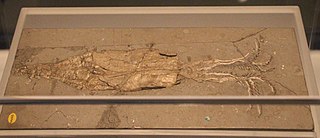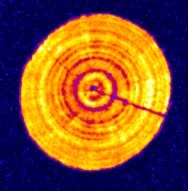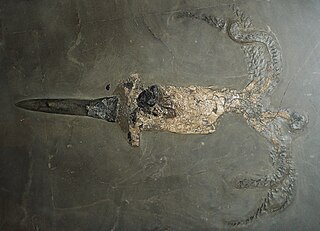| Mesoteuthis | |
|---|---|
| Scientific classification | |
| Kingdom: | |
| Phylum: | |
| Class: | |
| (unranked): | |
| Genus: | Mesoteuthis |
Mesoteuthis is a genus of belemnite, an extinct group of cephalopods. [1]
A belemnite originally described as Cylindroteuthis confessa has been re-described as Mesoteuthis soloniensis. [2]

Cylindroteuthis is a genus of belemnite that lived from the Early Jurassic to the Early Cretaceous. Its fossils have been found in Asia, Europe, North America, and New Zealand.

Belemnotheutis is an extinct coleoid cephalopod genus from the middle and upper Jurassic, related to but morphologically distinct from belemnites. Belemnotheutis fossils are some of the best preserved among coleoids. Remains of soft tissue are well-documented in some specimens, even down to microscopic muscle tissue. In 2008, a group of paleontologists even recovered viable ink from ink sacs found in several specimens.
Hematites is a genus of belemnite from the Mississippian Epoch.
Aulacoceras is a genus of belemnite, an extinct group of cephalopods.

Belemnopsis is a genus of belemnite, an extinct group of cephalopods.
Brevibelus is a genus of belemnite, an extinct group of cephalopods.
Calliconites is a genus of belemnite, an extinct group of cephalopods.
Conoteuthis is a genus of belemnite, an extinct group of cephalopods.
Dicoelites is a genus of belemnite, an extinct group of cephalopods.
Diplobelus is a genus of belemnite, an extinct group of cephalopods.
Gonioteuthis is a genus of belemnite, an extinct group of cephalopods. It grew to a body length of 8 inches and fed on small marine animals. Fossils of Gonioteuthis have been found in the Netherlands, Germany, and Sweden in rocks dated to the late Cretaceous Period, specifically 85 to 70 million years ago.

Hastites is a genus of belemnite, an extinct group of cephalopods.

Hibolites is a genus of belemnite, an extinct group of cephalopods.

Neohibolites is a genus of belemnite, an extinct group of cephalopods.

Passaloteuthis is a genus of belemnite, an extinct group of cephalopods. Belemnites are typically known for having about 40 micro-hooks on each one of its appendage. However, Passaloteuthis is notable for being associated with a pair of mega-hooks known as onychites. These hooks are tentatively interpreted as male-specific features, though their exact function is still unknown.
Permoteuthis is a genus of belemnite, an extinct group of cephalopods.

Youngibelus is a genus of belemnite, an extinct group of cephalopods.
Rhabdobelus is a genus of belemnite, an extinct group of cephalopods.

Belemnitida is an extinct order of squid-like cephalopods that existed from the Late Triassic to Late Cretaceous. Unlike squid, belemnites had an internal skeleton that made up the cone. The parts are, from the arms-most to the tip: the tongue-shaped pro-ostracum, the conical phragmocone, and the pointy guard. The calcitic guard is the most common belemnite remain. Belemnites, in life, are thought to have had 10 hooked arms and a pair of fins on the guard. The chitinous hooks were usually no bigger than 5 mm (0.20 in), though a belemnite could have had between 100 and 800 hooks in total, using them to stab and hold onto prey.

Belemnites is a genus of an extinct group of cephalopods belonging to the order Belemnitida. These cephalopods existed in the Early Jurassic period from the Hettangian age to the Toarcian age (175.6–183.0). They were fast-moving nektonic carnivores.
http://www.servinghistory.com/topics/Mesoteuthis